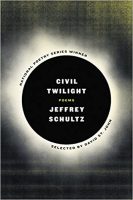October 12, 2017
Edited by David Sanders
Specimen Days
1685—Geeraerdt Burns, theologist/poet/historian, dies at 59.
1694—Matsuo Basho, greatest Japanese haiku poet, dies.
1820—Elias Annes Borger, theologist/poet (Ode on the Rhine), dies at 36.
1832—Walter T Watts-Dunton, England, lawyer/poet/writer (Aylwin), is born.
1887—Paula von Preradović, Croatian-Austrian poet (d. 1951), is born.
1896—Eugenio Montale, Italian poet/translator (Xenia-Nobel 1975), is born.
1910—Robert Fitzgerald, American poet and translator (d. 1985), is born.
1970—Mustafa Zaidi, Pakistani poet (b. 1930), dies.
1994—Gérald Godin, Québécois poet and politician (b. 1938), dies.

The cicadas chatter on the bald hill –
Rising, to wander in bewilderment
With the sun's dazzle, and the sorry thought
How all our life, and all its labors spent,
Are like a man upon a journey sent
Along a wall that's sheer and steep and
endless, dressed
With bits of broken bottles on its crest.
—from "The Wall" By Eugenio Montale
[translated by Maurice English]
“All our life, & all its labors spent, / Are like a man upon a journey sent / Along a wall that’s sheer & steep & / endless” – Eugenio Montale
World Poetry
Revolution is a Poem: Why a Punjabi Poet Killed by Khalistanis is Ruffling Feathers in Contemporary India?
On the highway from Jalandhar to Nakodar, Talwandi Salem village declares its link to one of Punjab’s most famous poets through the Pash-Hansraj Memorial Complex that comes up just ahead of the village. “Complex” is an aspiration for this dusty open ground, a raised platform at the far end, and a small room to each side of the dais. Behind it is the village where Avtar Singh Sandhu, the poet better known as Pash, was born and lived most of his life. In one of its fields, now lush green and fragrant with rice, he was shot dead by Khalistanis on March 23, 1988.
Leonard Cohen's Final Book Due Out in October 2018

The final book of poetry Leonard Cohen wrote, put together himself and finished in the months before his death last November will hit shelves next year. McClelland and Stewart said Friday it will release "The Flame" on Oct. 16, 2018. The publishing house describes the book as "a stunning collection of Cohen's last poems, selected and ordered by the author in the final months of his life."
The final book of poetry Leonard Cohen wrote, finished in the months before his death last November, will hit shelves next year.
Recent Reviews
Jill Bialosky, Poetry Will Save Your Life: A Memoir (Atria Books, 2017)
by William Logan
Jill Bialosky has written a memoir concealed within an anthology of poems. The world is crowded with memoirs, which universities sometimes insist on calling “life-writing,” a term so unlovely that writers have stabbed themselves with a pen rather than use it. The idea of using poetry in service of autobiography is an old one—Dante’s La Vita Nuova is the best known of medieval prosimetrum works; but in the wake of Rousseau the Romantics had a taste for leaving behind—in prose, poetry, or both—a private record of poetic life. Coleridge’s Biographia Literaria and Wordsworth’s The Prelude are not the only access to those complicated men, but their force and intuition make them indispensable to each poet’s version of poetic evolution.
Five Decades of Frank Bidart’s Verse, From Masks to Self-Mythology
by Major Jackson
Most serious readers agree: The direction of American poetry has, on the whole, remained stagnant since the widespread adoption of psychotherapy and counseling to help people grasp the complex undercurrents and fallout of family dysfunctions, grueling addictions, pitched anxieties and illicit yearnings.
Jill Bialosky has written a memoir concealed within an anthology of poems.
Broadsides
How Opera Inspired Walt Whitman’s ‘Leaves of Grass’
by Joshua Barone

I hear the chorus, it is a grand opera,
Ah this indeed is music — that suits me.
Walt Whitman wasn’t always an opera fan. As a budding young journalist in New York, he was known to take potshots at the etiquette and artifice of what he saw as an aristocratic pastime. Whitman cultivated a more democratic persona and preferred popular songs, which he called “heart” — as opposed to “art” — music.
A Tale of Two Sylvias: On the Letters Cover Controversy: What Do We Look for in a Literary Icon?
by Nichole LeFebvre Share
I leave my house wearing a baby blue wrap skirt, ankle socks, and two-tone oxfords. It’s mild for early summer, my bare legs paired with a sweater: champagne angora that frizzes an inch off each shoulder. I’m headed to the community writing school behind the bagel shop where I’m teaching The Art of Character. Before I left, as I’d wrapped my hips in the skirt and tucked in the sleeveless collared blouse, I thought about dress: professional enough to be taken seriously, casual enough to look like myself. Clean, pressed. Nothing too low-cut. I thought, as I often think, that my male peers don’t worry about this, don’t need their outfits to prove authority. They look like they always look: breezy and indifferent in collared shirts or t-shirts and jeans.
Critics And Writers Are Defending An Accused Plagiarist. Here’s Why They’re Wrong.
by Talya Zax
Poet, memoirist, novelist and editor Jill Bialosky, this week accused of plagiarism in her new memoir “Poetry Will Save Your Life,” has degrees from three universities. Each of them has clear standards as to what counts as plagiarism. “Reproducing another person’s work, whether published or unpublished” counts, according to Ohio University, from which Bialosky has a Bachelor’s degree. Yes, they specify, that includes Wikipedia.
“I hear the chorus, it is a grand opera, / Ah this indeed is music — that suits me.” – Walt Whitman
Drafts & Fragments
“Making Poetry Great Again”: A Book That Uses Trump’s Words to Troll Liberals
by Rebecca Mead
A few years ago, in 2011, in an article for the National Review titled “The Right Kind of Tyrant,” the comedy writer Rob Long pointed out that in the world of business, it’s easy to find bosses who are autocratic, capricious, and demeaning to their subordinates. “There are screamers and throwers and silent-treatment types—all kinds and shapes of cruelty,” he wrote. Long, who is a producer as well as a writer—he earned his most prestigious credit a quarter century ago, on “Cheers”—is one of Hollywood’s declared Republicans. This is a position that necessitates a contrarian streak, and in the article, which was written in praise of the hard-driving style of Steve Jobs, he displayed it. “It’s hard, though, when you reach a certain age, not to instinctively side with the psychopaths,” he wrote.
A few years ago, comedy writer Rob Long pointed out it’s easy to find bosses who are autocratic and demeaning to their subordinates.
Poetry In the News
Jill Bialosky, Poet and Editor, Faces Plagiarism Accusations
Jill Bialosky, a prolific poet and essayist who is a top editor at W. W. Norton & Company, is facing accusations that passages in her new memoir, “Poetry Will Save Your Life,” are plagiarized. In a review posted online Wednesday in The Tourniquet Review, a literary journal, the critic William Logan claimed that Ms. Bialosky had “plagiarized numerous passages from Wikipedia and the websites of the Academy of American Poets and the Poetry Foundation.”
Rupi Kaur Is Kicking Down the Doors of Publishing

On Monday, about 1,000 people, most of them young women, lined up at a New York City theater for a poetry reading by Rupi Kaur. Giant fake sunflowers outside made a safe space for guests to pose for Instagram in their hijabs, baseball caps, pantsuits, combat boots and cocktail dresses.
On Monday, about 1,000 people, most of them young women, lined up at a New York City theater for a poetry reading by Rupi Kaur.
New Books
Civil Twilight: Poems by Jeffrey Schultz
[Paperback] Ecco, 104 pp., $15.99

Jeffrey Schultz brings his distinct voice to bear on the stuff of twenty-first-century America—languishing FOIA requests, graffiti-covered city walls, the violent machinery of the state—without abandoning hope that the language of poetry might transport us to some better and as-yet-unimaginable world. Turning a call to be “civil” on its head, this collection nudges the reader toward revolution.
Let's All Die Happy by Erin Adair-Hodges
[Paperback] University of Pittsburgh Press, 112 pp., $15.95
“With ‘a tube sock of doom’ and ‘lifeboats with lions,’ Erin Adair-Hodges uses a searing wit and a boundless reservoir of heart to expertly navigate the complexities of family histories and American anxieties. This is stunning debut collection. Always urgent, nuanced and deeply felt, Let’s All Die Happy has something important to show us about being alive.”—Matthew Olzmann
Rift of Light by William Logan
[Paperback] Penguin Books, 112 pp., $18.00

William Logan is widely admired as one of our foremost masters of free verse as well as formal poetry; his classical verve conjures up the past within the present and the foreshadowings of the present within the past. In their sculptural turns, their pleasure in the glimmerings of the sublime while rummaging around in the particular, the poems in Rift of Light, Logan's eleventh collection, are a master class of powerful feeling embedded in language. Ranging from Martin Luther to an abandoned crow, from a midwife toad to a small-town janitor, from actress Louise Brooks to Dürer's stag beetle, Logan shows an encyclopedic attention to the passing world. Dry, witty, skeptical, these dark and acidic poems prove a constant and informing delight.
Stumbling Blocks: Roman Poems by Karl Kirchwey
[Paperback] Triquarterly, 104 pp., $16.95
Through six earlier books Karl Kirchwey has rewarded readers with poems of great musicality, visual richness, and historical resonance. Stumbling Blocks: Roman Poems represents a culmination of his “formal mastery”—an honor often too loosely bestowed in contemporary American poetry, but one Kirchwey thoroughly earns.
Late Empire by Lisa Olstein
[Paperback] Copper Canyon Press, 104 pp., $16.00

In her fourth book―a gorgeous call-to-arms in the face of our current social and political conditions―Lisa Olstein employs her signature wit, wordplay, candor, and absurdity in poems that are her most personal―and political―to date. Like a brilliant dinner conversation that ranges from animated discussions of politics, philosophy, and religion to intimate considerations of motherhood, friendship, and eros, Olstein’s voice is immediately approachable yet uncomfortably at home in the American empire.
Jeffrey Schultz brings his distinct voice to bear on the stuff of twenty-first-century America.
Correspondences
War Baby: The Amazing Story of Ocean Vuong, Former Refugee and Prize-winning Poet
by Claire Armitstead
There’s a photograph on the jacket of Ocean Vuong’s debut poetry collection of a small boy sitting on a wooden bench. Encircled by the arms of two women in summery cottons, he gazes steadily at the camera. The elegance is deceptive: it was taken when the family were living in poverty in a refugee camp in the Philippines, en route for the US, after being expelled from Vietnam. Vuong, the only child in the three-generation exodus, was two years old. A fellow refugee was bartering photographs for food. “That picture cost my family three tins of rice, according to my mother,” he says. “Each of us gave up our ration just to be seen.”
The PEN Ten with Safiya Sinclair

The PEN Ten is PEN America’s weekly interview series. This week, we interviewed Jamaican poet Safiya Sinclair, author of Cannibal, which won the 2015 Prairie Schooner Book Prize in Poetry and a 2016 Whiting Writers’ Award.
Commonplace: Conversations with Poets (and Other People)
Episode 38: Sharon Olds
by Rachel Zucker

Rachel Zucker talks to acclaimed, award winning poet Sharon Olds about dope, talking nicely to yourself when you’re alone, noticing one’s tiniest thoughts, the advantages of being an “ordinary enough” person, Brenda Hillman and Community of Writers (formerly known as Squaw Valley), teaching, the rhythm of writing, Odes, sharing poems, being truthful, Galway Kinnell, how to deal with bad reviews, how to deal with praise, envy, talent, self-esteem, jealousy, heteromania, eros, intimacy, anger, dancing, parent-child separation and so much more.
The PEN Ten is PEN America’s weekly interview series. This week, they interviewed Jamaican poet Safiya Sinclair, author of Cannibal.
Envoi: Editor’s Notes
Eugenio Montale and the Uselessness of Poems
I was going to write something about the recent plagiarism brouhaha, documented above. But the ad hominem attacks I’ve read on both sides, the righteous indignation on both sides, leaves a bitter taste in my mouth. You can check out the three articles I’ve placed in this week’s edition of PNIR, and, if you're so inclined, you can follow the action on Facebook, by tracking either William Logan or Jill Bialosky or both. Have at it.
But here, instead, are some words from Eugenio Montale, whose birthday is this week, taken from his 1975 Nobel lecture.
“I have written poems and for this I have been awarded a prize. But I have also been a librarian, translator, literary and musical critic and even unemployed because of recognized insufficiency of loyalty to a regime which I could not love. A few days ago a foreign journalist came to visit me and she asked me, "How did you distribute so many different activities? So many hours for poetry, so many hours for translation, so many for clerical activity and so many for life?" I tried to explain to her that it is to plan a lifetime as one plans an industrial project. In the world there is a large space for the useless, and indeed one of the dangers of our time is that mechandizing of the useless to which the very young are particularly sensitive.
At any rate I am here because I have written poems. A completely useless product, but hardly ever harmful and this is one of its characteristics of nobility. But it is not the only one, since poetry is a creation or a sickness which is absolutely endemic and incurable.”
“Poems are a completely useless product, but hardly ever harmful.” – Eugenio Montale